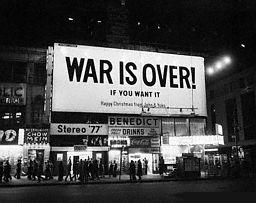
Iran's recent refusal to suspend its uranium enrichment program before the mandated August 31st deadline has renewed fears that the Bush Administration may be forced into using the military option; sending missiles and fighter jets into Iran hoping to target their nuclear facilities. War must be avoided unless absolutely necessary and after some consideration I have come up with several peaceful solutions that may avert the crisis.
We could go to the United Nations and get a resolution passed that declares the entire Middle East will be a nuclear-free zone. Hell we can go a step further and even try to get one passed that says it will be a zone free of all weapons of mass destruction, that would solve a whole host of problems. If it's the case that Iran is really just scared that the US is going to go nuts and nuke them, we could pass a resolution against saying nuclear armed states cannot use their atomic bombs on non-nuclear states.
I think those are some really good ideas; but once Iran is solved what if this happens again, with another non-nuclear country starting up a nuclear program and claiming its not fair that some countries can have nuclear energy plants but they can't. Here is my best idea yet. We'll set up an international committee, like the IAEA, that controls fissionable material necessary for nuclear energy. Individual states could apply to the committee for use of the material for a nuclear energy program, but must agree to subject themselves to unrestricted monitoring to verify their peaceful intent. Skeptics might say Iran would not agree to those resolutions; but here is the kicker, Iran has no choice. Only the United States and four other countries have a veto power!
That veto power has been used, or threatened to be used and thus effectively blocked, every single one of the resolutions I stated above, in 2005 alone1. All of them were proposed in the United Nations, all of them were strongly supported by Iran and all of them won an overwhelming vote for passage. All of them were blocked by the United States and though widely reported around the world, the highly discipled US press ignored all of them. Just like with Iraq, there is a lot of information about the dispute with Iran that Americans need to know, but the American media refuses to tell them.
American's might want to know that some of Iran's nuclear facilities were built by the United States, complete with American supplied weapons-grade uranium. The American people also might want to know the US solidified their support for the Iranian nuclear program in 1975 under a directive entitled "US-Iran Nuclear Cooperation" and it had the full support of Ford's Secretary of Defense, Donald Rumsfeld.
But here is where it gets dangerous: The American people don't know that the Iranian believes that the United States wants to attack and there is nothing Iran can do to stop it. That is why Iran has reiterated over and over again that they will completely give up their program if they receive security assurances from the US government. That is also why Iran actually did suspend uranium enrichment in 2004 in agreement with the EU-3, when the Europeans promised to get those security assurances from the US. But the Bush Administration refused and kept making threats at Iran; resulting in the resumption of their program, undoubtedly to the delight of Bush Admin hardliners.
Now there is a race against the clock as Iran speeds up its nuclear program while continuing to ask for negotiations with the West, while hardliners in the Bush Administration seek to map out targets, manipulate intelligence and convince the President to attack, against the advice of, if the reports are true, Secretary of State Rice and the entire US military establishment.
We are certainly in a dickens of a good time, to paraphrase Donald Rumsfeld. Unlike Iraq, Iran currently has the backing of 2/3 of UN member states; and even the United States had to concede that Iran has the " inalienable right" to a nuclear energy program; to quote Iranian President Ahmendinejihad who was in turn quoting Article IV of the Nuclear Non-Probliferation Treaty to which both Iran and the US are signatories. If the United States were truly interested in a peaceful solution the ends without a nuclear Iran, they have ample opportunities before them. If the Bush Administration chooses war, it is because they were looking for a war with Iran for a long time and are seizing the opportunity, and it will be a disaster. Iran's nuclear facilities are scattered about the country and the US only knows the locations of a handful. The attack, successful or not, will radicalized the Islamic world to a degree we have never seen before and will probably end the 1,000 year old fued between Sunnis and Shiites. And it will give the entire non-nuclear world three pieces of advice;
___________________________________________________


